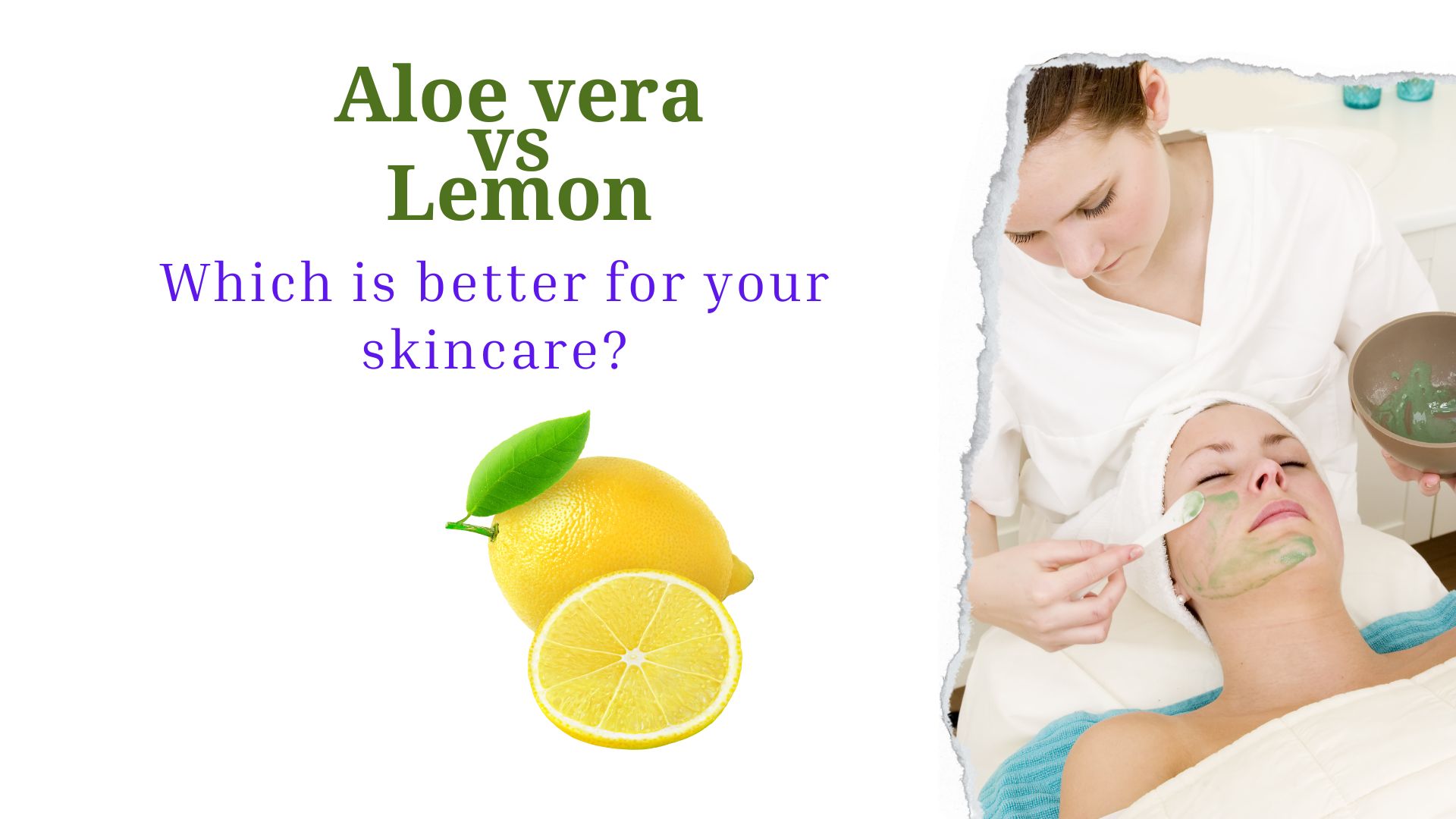Key Takeaways:
- Both lemon and aloe vera have potential skincare benefits, but they also have their drawbacks.
- Lemon is a good source of vitamin C and has exfoliating, antioxidant, and anti-inflammatory properties that may be helpful for certain skin concerns. However, it can be drying and irritating to some skin types, may increase sensitivity to the sun, and can cause bleaching or discoloration of fabrics and surfaces.
- Aloe vera is generally considered a gentler and more versatile option for skincare due to its moisturizing, soothing, and anti-inflammatory properties. However, there is limited research on its effectiveness for certain skin concerns, such as aging and hyper pigmentation, and some people may be allergic to aloe vera.
- The best choice for your skincare routine will depend on your individual skin needs and concerns. It’s always a good idea to consult with a dermatologist or skincare professional for personalized advice, and to pay attention to your skin’s reactions to different products.
- By taking a careful and personalized approach to skincare, you can help keep your skin looking and feeling its best.
When it comes to taking care of your skin, there are endless options and conflicting advice on what works best. Two popular natural ingredients that often come up in skincare discussions are lemon and aloe vera. Both have their supporters, but which one is truly better for your face?
Lemon is known for its high vitamin C content, which can help brighten and even out skin tone. It also contains citric acid, which can exfoliate and reduce the appearance of dark spots.
Lemon also has antioxidant and anti-inflammatory properties that may help with acne and other skin concerns. On the downside, lemon can be drying and irritating to some skin types, especially if used undiluted or in excess.
It may also increase sensitivity to the sun, so it’s important to use sun protection after applying lemon to the skin. And be careful when using lemon topically, as it can cause bleaching or discoloration of fabrics and surfaces.
Aloe vera, on the other hand, is generally considered a gentler and more versatile option for skincare. It is suitable for all skin types, including sensitive skin, and has moisturizing and soothing properties that can help with dryness and redness.
Aloe vera may also help with acne, scarring, and other skin concerns due to its anti-inflammatory and wound-healing properties. It can even be used as a natural makeup remover and facial cleanser.
However, there is limited research on its effectiveness for certain skin concerns, such as aging and hyper pigmentation. Some people may also be allergic to aloe vera, so it’s important to test a small patch of skin before using it on a larger area.
So, which is better for face skincare: lemon or aloe vera? While both have potential skincare benefits, aloe vera is generally considered the safer and more versatile option due to its gentler properties and ability to address a wider range of skin concerns.
But as with any skincare product, it’s important to pay attention to your skin’s needs and reactions, and to consult with a dermatologist if you have any concerns. By taking a careful and personalized approach to skincare, you can help keep your face looking and feeling its best.
The Benefits of Lemon for Face Skincare
- High vitamin C content: Lemon is a good source of vitamin C, which is an important nutrient for healthy skin. Vitamin C helps to protect the skin from free radical damage, which can cause signs of aging such as wrinkles and fine lines. It may also help to brighten and even out skin tone by inhibiting the production of melanin, the pigment that gives skin its color.
- Exfoliating properties: Lemon contains citric acid, an alpha hydroxy acid (AHA) that can help to gently exfoliate the skin. By removing dead skin cells, citric acid can help to unclog pores, reduce the appearance of dark spots, and improve skin texture.
- Anti-inflammatory and antioxidant properties: Lemon has anti-inflammatory and antioxidant properties that may help to reduce the appearance of acne and other skin concerns. The vitamin C and flavonoids in lemon can help to reduce inflammation and protect the skin from oxidative stress.
- Brightening effect: Lemon may have a brightening effect on the skin due to its high vitamin C content and ability to inhibit melanin production. This can help to improve the overall appearance of the skin and give it a healthy, radiant glow.
- Natural astringent properties: Lemon has natural astringent properties that can help to tighten and tone the skin. This can help to reduce the appearance of pores and give the skin a firmer, more youthful look.
- May help with acne: The anti-inflammatory and antibacterial properties of lemon may help to reduce the appearance of acne and prevent new breakouts. The citric acid in lemon can also help to exfoliate and unclog pores, which can prevent acne-causing bacteria from accumulating on the skin.
The Benefits of Aloe Vera for Face Skincare
Gentle and Suitable for All Skin Types
Aloe vera is a gentle, soothing ingredient that is suitable for all skin types, including sensitive skin. It has a cooling and hydrating effect on the skin, making it ideal for use on irritated or inflamed skin.
Aloe vera is also non-comedogenic, meaning it won’t clog pores, which makes it suitable for use on acne-prone skin.
Moisturizing and Soothing Properties
Aloe vera is a natural moisturizer that can help to hydrate and plump up the skin.
It contains compounds called polyacrylamide that help to retain moisture, as well as antioxidants and vitamins that can help to nourish and protect the skin.
Aloe vera also has soothing properties that can help to reduce redness, irritation, and dryness.
May Help with Acne, Scarring, and Other Skin Concerns
Aloe vera has anti-inflammatory and wound-healing properties that may help to reduce the appearance of acne, scarring, and other skin concerns.
It can help to calm and soothe irritated skin, and may also have antibacterial properties that can help to kill acne-causing bacteria.
Aloe vera may also help to reduce the appearance of scarring by promoting the production of collagen and elastin, the proteins that help to give the skin its structure and elasticity.
Natural Makeup Remover and Facial Cleanser
Aloe vera can be used as a natural makeup remover and facial cleanser. Its gentle, non-drying formula is effective at removing makeup and impurities from the skin without stripping it of its natural oils.
Aloe vera can also help to balance the pH of the skin, making it an ideal choice for those with sensitive or easily-irritated skin.
Drawbacks of Lemon for Face Skincare
Can Be Drying and Irritating to Some Skin Types
Lemon is a potent ingredient that can be drying and irritating to some skin types, especially if used undiluted or in excess. Lemon contains citric acid, which can be harsh on the skin if it is not properly diluted or if it is used too frequently.
It is important to dilute lemon with water or a carrier oil, such as olive oil or coconut oil, before applying it to the skin. It is also important to start with a small amount and gradually increase the frequency of use to see how your skin reacts.
Photo Sensitivity
Lemon may increase sensitivity to the sun, so it’s important to use sun protection after applying lemon to the skin. The citric acid in lemon can make the skin more susceptible to sunburn and other forms of sun damage.
If you plan to go outside after using lemon on your skin, it is important to apply a broad-spectrum sunscreen with an SPF of at least 30 to protect your skin from the sun’s harmful UV rays.
May Cause Bleaching or Discoloration of Fabrics and Surfaces
Lemon can cause bleaching or discoloration of fabrics and surfaces, so it’s important to be cautious when using lemon topically.
If you get lemon on your clothes or bedding, it is important to wash it off immediately to prevent bleaching or discoloration. It is also important to be careful when using lemon around surfaces that are prone to staining or discoloration, such as wood or marble.
Lemon can also be harmful to some plants, so it’s important to avoid getting it on plants or flowers.
Limited Research on Certain Skin Concerns
While lemon has many potential skincare benefits, there is limited research on its effectiveness for certain skin concerns, such as aging and hyper pigmentation.
While some people may find that lemon helps to improve the appearance of their skin, it’s important to keep in mind that results may vary and that more research is needed to fully understand the benefits of lemon for skincare.
If you have specific skin concerns, it’s always a good idea to consult with a dermatologist or skincare professional for personalized advice.
The Drawbacks of Aloe Vera for Face Skincare
Allergic Reactions
Some people may be allergic to aloe vera, which can cause skin irritation, redness, and swelling. If you are using aloe vera on your skin, it’s important to test a small patch of skin before applying it to a larger area.
If you experience any adverse reactions, such as redness, itching, or swelling, discontinue use immediately and consult with a healthcare professional.
Not Suitable for Certain Skin Concerns
While aloe vera may be helpful for some skin concerns, it may not be suitable for others. For example, aloe vera may not be effective at treating certain types of acne, such as cystic acne, and may not be suitable for use on open wounds or broken skin.
If you have specific skin concerns, it’s important to consult with a dermatologist or skincare professional for personalized advice.
Not a Standalone Skincare Solution
While aloe vera can be a helpful addition to your skincare routine, it should not be used as a standalone solution for all of your skin concerns.
Aloe vera works best as part of a comprehensive skincare routine that includes a variety of different products and ingredients.
May Interact with Certain Medications
Aloe vera may interact with certain medications, such as diuretics, laxatives, and diabetes medications.
If you are taking any medications, it’s important to consult with a healthcare professional before using aloe vera on your skin.
Not Suitable for Use on the Lips
While aloe vera can be a helpful ingredient for the skin, it is not suitable for use on the lips. Aloe vera may cause irritation or dryness on the lips, and is not effective at treating common lip concerns such as chapped or dry lips.
Not Suitable for Use on the Eye Area
Aloe vera should not be used on the eye area as it may cause irritation or dryness. The skin around the eyes is thin and sensitive, and requires gentle, specifically formulated products to avoid irritation.
If you have concerns about the appearance of your eye area, it’s important to consult with a dermatologist or skincare professional for personalized advice.
Conclusion
In conclusion, both lemon and aloe vera have potential skincare benefits, but they also have their drawbacks. Lemon is a good source of vitamin C and has exfoliating, antioxidant, and anti-inflammatory properties that may be helpful for certain skin concerns.
However, it can be drying and irritating to some skin types, may increase sensitivity to the sun, and can cause bleaching or discoloration of fabrics and surfaces. Aloe vera is generally considered a gentler and more versatile option for skincare due to its moisturizing, soothing, and anti-inflammatory properties.
However, there is limited research on its effectiveness for certain skin concerns, such as aging and hyper pigmentation, and some people may be allergic to aloe vera. Ultimately, the best choice for your skincare routine will depend on your individual skin needs and concerns.
It’s always a good idea to consult with a dermatologist or skincare professional for personalized advice, and to pay attention to your skin’s reactions to different products. By taking a careful and personalized approach to skincare, you can help keep your skin looking and feeling its best.





